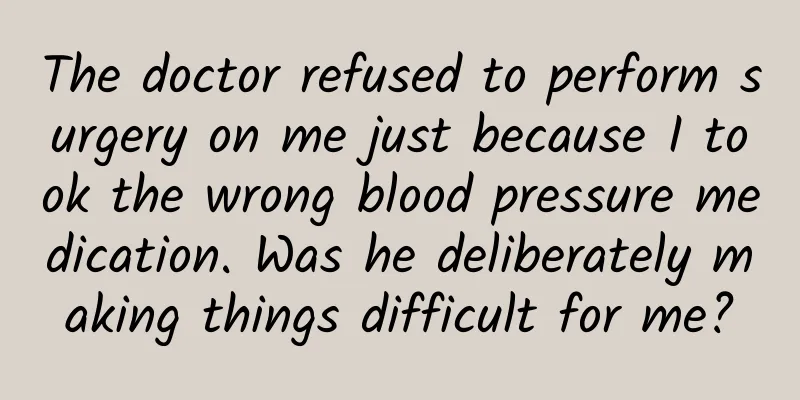The doctor refused to perform surgery on me just because I took the wrong blood pressure medication. Was he deliberately making things difficult for me?

|
Mr. Liu, 78 years old this year, had never been sick in his life, but he was hospitalized not long ago. The doctor diagnosed him with inguinal hernia. As people age, their ligaments and fascia become loose. In places like the groin, where the abdominal pressure suddenly increases, hernias are very likely to occur. The contents of a hernia can be the intestine or the greater omentum. If left untreated for a long time, necrosis of the contents may also occur. In particular, in the case of incarceration of the intestine, surgery is generally required in a timely manner. (The picture and text are unrelated) Teaching Rounds Outside the Home The photo is from the 2nd "Renxin Cup Most Beautiful Angels in White Photo Collection Competition" Photographer: Meng Qingcheng However, Mr. Liu, who thought that this was a minor operation, was told by the surgeon that he could not undergo the operation for the time being because the antihypertensive medication he was taking was not suitable. The confused family members quickly went to the surgeon to find out what happened. The surgeon said: It was mainly related to anesthesia. The specific reason would have to be explained by the anesthesia department. In this way, the group rushed to the anesthesiology department. On the way, everyone was thinking: How can you, an anesthesiologist, take care of so many things? Just give your anesthesia. Soon, everyone arrived at the anesthesiology department. After hearing the purpose of the patient's family's visit, the director of the Anesthesiology Department reconfirmed the antihypertensive drugs the patient was taking. When he learned that it was indeed a blood pressure-lowering drug called "reserpine", he also expressed his firm belief that surgery was not possible. The family members said unconvincedly: If the patient is about to die, won’t you perform surgery? Seeing that the family members were quite emotional, the director of the Anesthesiology Department explained: If it was a life-threatening operation, it would definitely be a different matter. Hearing this, the family members questioned: Our old man is so old, what if he gets into danger if we don’t actively undergo surgery? The director of the anesthesiology department comforted me by saying: Postponing the surgery is also for safety reasons. This point has also been carefully considered. I learned from the surgeon before that this is an inguinal hernia that can be reduced on its own. In other words, the contents inside are not ischemic, and may even be reduced on their own due to the reduction of abdominal pressure. Will there be no ischemic necrosis? The family members questioned. The director of the anesthesiology department said: "Based on the surgical diagnosis, this is the case at present. Of course, nothing in medicine is 100% certain." The family member then asked: Who is responsible if something goes wrong? Hearing this, the director of the anesthesiology department felt mixed emotions: He really didn't want to serve such a family member. But as a doctor, he couldn't refuse. If every hospital was afraid of accidents and refused to treat patients, who could the people rely on? Although he felt uncomfortable, he still hoped that the family members could understand him, so he asked everyone to sit down and talk slowly with a smile on his face. After sitting down, everyone stared at the director of the anesthesiology department, thinking: Let's see what excuses you can come up with. The director of the anesthesiology department had also experienced many ups and downs, and he said slowly: Since you come to us for treatment, we cannot talk about responsibility right away. Our goal should first be how to cure this disease. At this time, a family member said: I don't think you want to see a doctor! Why are you delaying such a minor operation? Just because we took the wrong antihypertensive medicine, we have to postpone it for a week? Do you know how much more it costs to stay in the hospital for a week? A series of questions instantly stirred up the atmosphere. The eyes of the people who had been calm just now seemed to be filled with anger. Seeing this, the director of the anesthesiology department said: Since we are talking about money, let's talk about it. Taking this kind of medicine can easily cause unstable blood pressure during surgery. If the blood pressure is unstable, do you need to use blood pressure-increasing or antihypertensive drugs? Do you know that the drugs used in surgery basically cost dozens or hundreds of dollars per tube? If the blood pressure is adjusted before the operation, can the chance of using these drugs be reduced? Seeing everyone was silent, the director of the anesthesiology department took the opportunity to say: If you just use more medicine, the result is still relatively good. However, if there are other problems due to high or low blood pressure, the patient may have to increase the length of hospital stay or even stay in the intensive care unit. By then, it will be more than a few hundred dollars. We say this to try to get to that point. Although no one dares to make this guarantee, at least we have to try. You can't go to the tiger mountain knowing that there is a tiger there, right? Seeing that the director of the anesthesiology department really meant well, everyone softened their attitude and asked: Is this medicine so powerful? The director of the anesthesiology department explained: To be honest, we haven't encountered many serious incidents. However, since the experts have said so, we still have to be careful. Existing studies have shown that since this drug lowers blood pressure by depleting catecholamines in the body, it is very likely that intraoperative surgical stress or major trauma will affect circulatory stability. Even when using drugs that act on catecholamine receptors, refractory hypotension may occur. In other words, it may happen that blood pressure cannot be raised. At such an old age, if hypotension lasts for a long time, no one can guarantee that nothing will happen. At this point, everyone finally understood. After a round of thanks, they returned to the ward to comfort Old Man Liu. Here, we would like to remind everyone: During hospitalization and surgery, you must cooperate closely with your doctor. Especially for patients who take reserpine or antihypertensive drugs containing this ingredient, you must tell the doctor the truth! [Warm Tips] Follow us, there are a lot of professional medical knowledge here to help you understand the anesthesia issues in surgery~ |
<<: What does it feel like when your skin is dehydrated? Four major signs of dehydrated skin
>>: What should I do if my baby doesn’t like to eat complementary food during the teething period?
Recommend
What causes vulvar pain? The situation is so complicated
Women often experience vulvar pain. The causes of...
I'm pregnant and I'm bleeding
Some pregnant women will experience continuous bl...
What is the difference between pineapple beer and beer? Is pineapple beer acidic or alkaline?
Pineapple beer is a light yellow, clear, transpar...
If a pregnant woman has itching, is it a boy?
What many expectant mothers want to know most dur...
Causes of heavy menstrual flow and large blood clots
Vaginal bleeding during menstruation is a normal ...
The color of your quilt really affects your sleep quality! Change it now!
Can the color of the quilt affect your sleep? ——R...
How long does it take for a woman to get pregnant after having her IUD removed?
Ten months of pregnancy is just to wait for the a...
Is it possible to get pregnant in the same month after a biochemical pregnancy?
Biochemical pregnancy is a current method of preg...
Will breast fibroids recur after surgery?
Breast fibroadenomas are relatively common among ...
How to judge miscarriage and menstruation?
Some women find bleeding from their lower body wh...
What are the reactions on the first day of taking the medicine?
Nowadays, many pregnant women choose medical abor...
How long does it take for mastitis lumps to go away?
Mastitis often causes lumps to form. If you touch...
The most common and effective method for treating cervicitis
According to your question, how to treat cervicit...









